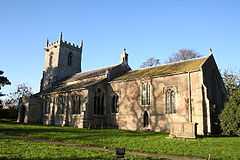Owston Ferry
| Owston Ferry | |
 Church of St Martin, at Owston Ferry |
|
 Owston Ferry | |
| Population | 1,128 (2001 Census) |
|---|---|
| OS grid reference | SE805005 |
| - London | 135 mi (217 km) SSE |
| Unitary authority | North Lincolnshire |
| Ceremonial county | Lincolnshire |
| Region | Yorkshire and the Humber |
| Country | England |
| Sovereign state | United Kingdom |
| Post town | DONCASTER |
| Postcode district | DN9 |
| Dialling code | 01427 |
| Police | Humberside |
| Fire | Humberside |
| Ambulance | East Midlands |
| EU Parliament | Yorkshire and the Humber |
| |
Owston Ferry is a village and civil parish in North Lincolnshire, England. It is situated on the west bank of the River Trent, and 9 miles (14 km) north from Gainsborough, and has a total resident population of 1,128.[1]
Sometimes referred to in short as Owston or Ferry, the village, which forms part of the Isle of Axholme, is bounded to the west by the A161 road and the village of Haxey. The River Trent is directly to the east. To the north, beyond a number of hamlets and villages, lies the River Humber. West Butterwick was originally a part of the township of Owston.
History
The name "Owston" is thought to derive from the Old Norse "austr+tun", meaning "east farmstead",[2] a view shared by other sources which outline that it specifically implied the "farmstead east of Haxey".[3] The name "Owston" is shared by at least two other settlements within the United Kingdom. In the 1086 Domesday Book, it is listed as "Ostone",[3] with the suffix "Ferry" (thought to imply the water vessel which may have been used to cross the Trent), in abeyance.
Owston Ferry Castle, also known as Kinnard's Ferry Castle, was a motte-and-bailey fortification from the 12th century. It lay on the site of an earlier, Roman castrum.[4] It was dismantled by order of Henry II of England in 1175-76 following the Revolt of 1173–1174.[5]
Owston Ferry Grade I listed Anglican parish church is dedicated to St Martin.[6] The church register dates from 1603.[7]
In 1885 Kelly's reported the existence of Wesleyan Primitive Methodist chapels,[8] a rope-walk, boat-building yard, several corn mills, and the manufacture of sacking and sail cloth. The parish was of 5,350 acres (22 km2). Wheat, barley, potatoes, beans and grass were grown.[7]
Government
As part of the provisions of the Local Government Act 1972, Owston Ferry formed part of the Boothferry district of the county of Humberside, having previously lain within the Parts of Lindsey from the historic county boundaries of Lincolnshire. Since 1996 however, Owston Ferry has formed part of the unitary authority area of North Lincolnshire.
Geography
At 53°29′42.8″N 0°47′8.3″W / 53.495222°N 0.785639°W (53.495228°, -0.785656°), and 140 miles (225 km) north-northwest of London, Owston Ferry stands on flat ground by the River Trent, opposite the hamlet of East Ferry.
The closest motorway to Owston Ferry is the M180, whilst Robin Hood Airport is 8 miles (13 km) to the south-east, in South Yorkshire.
The civil parish of Owston Ferry, includes the village of Owston Ferry, as well as a number of smaller localities, including West Ferry, Gunthorpe, Heckdyke and Melwood.
Education
Owston Ferry contains one primary school, St. Martin's Church of England Primary School.
Notable people
Epworth-born Alexander Kilham, founder of the Methodist New Connexion, worked in Owston Ferry during his teens.[9]
See also
References
- ↑ United Kingdom Census 2001. "Owston Ferry CP (Parish)". neighbourhood.statistics.gov.uk. Retrieved 13 June 2007.
- ↑ Mills, A. D. (1991) A Dictionary of English Place-Names, Oxford University Press
- ↑ 3.0 3.1 North Lincolnshire Council. "Owston Ferry Local History Pack". Retrieved 13 June 2007.
- ↑ Webster, Graham (2003). Rome against Caratacus. Routledge. p. 93. ISBN 978-0-415-23987-5.
- ↑ Fry, Plantagenet Somerset (2005). Castles: England + Scotland + Wales + Ireland. David & Charles Publishers. p. 66. ISBN 0-7153-2212-5.
- ↑ English Heritage. "Church of St Martin (1083261)". National Heritage List for England. Retrieved 15 August 2011.
- ↑ 7.0 7.1 Kelly's Directory of Lincolnshire with the port of Hull 1885, pp. 593, 594
- ↑ English Heritage. "Centenary Methodist Chapel (1049072)". National Heritage List for England. Retrieved 15 August 2011.
- ↑
 Lee, Sidney, ed. (1892). "Kilham, Alexander". Dictionary of National Biography 31. London: Smith, Elder & Co. p. 102.
Lee, Sidney, ed. (1892). "Kilham, Alexander". Dictionary of National Biography 31. London: Smith, Elder & Co. p. 102.
External links
 Media related to Owston Ferry at Wikimedia Commons
Media related to Owston Ferry at Wikimedia Commons- "Owston Ferry", Genuki.org.uk
- The Parishes of the Isle of Axholme: Owston Ferry, Isle of Axholme Family History Society
- Isle of Axholme, TheAxholmeInformer.net
| |||||||||||||||||